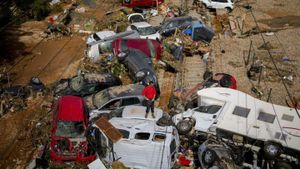Pope Francis has stirred significant attention with his recent call for the international community to investigate allegations of genocide related to Israel's military actions against Gaza. This call marks one of the pontiff's strongest critiques yet of the current conflict between Israel and Hamas.
According to excerpts from his forthcoming book, Hope Never Disappoints: Pilgrims Towards a Better World, scheduled for release this week, the Pope stated, "According to some experts, what is happening in Gaza has the characteristics of genocide." He emphasized the importance of closely examining the situation to determine if it aligns with the technical definitions established by legal experts and international bodies.
This unprecedented statement from the papacy arrives amid devastating numbers coming from Gaza, where Palestinian health authorities report over 43,000 casualties since the onset of the conflict. The violence began following Hamas’ attack on October 7, 2023, which resulted in the deaths of around 1,200 Israelis and involved the kidnapping of approximately 250 hostages.
Following large-scale military operations, estimates suggest the destruction of nearly 60% of Gaza’s buildings. Reports from the UN highlight the disproportionate impact on civilians, noting nearly 70% of casualties are women and children.
Pope Francis's remarks are significant not just for their moral weight but also for how they reflect the growing concern over Israel's actions. For years, he had criticized the military campaign's proportionality but had refrained from explicitly endorsing the genocide label until now.
His call for investigation aligns with international scrutiny, as just last fall, South Africa filed charges against Israel at the International Court of Justice (ICJ), accusing the state of genocide. Other nations have joined South Africa, complicity issues surrounding this case, which remains unresolved.
Israel has vigorously denied the genocide allegations, claiming its operations are defensive measures against Hamas, which it views as a terrorist organization. Ambassadors and officials, including Yaron Sideman, the Israeli envoy to the Holy See, have labeled the genocide claims as unfounded, stating, “There was a genocidal massacre on 7 October 2023 of Israeli citizens, and since then, Israel has exercised its right of self-defense against attempts from seven different fronts to kill its citizens.”
The Israeli government has rallied its allies, particularly the United States, to dismiss the genocide accusations and defend its military activities, which some have characterized as disproportionate responses to provocations from Hamas. U.S. officials have reinforced Israel’s stance, leading to international debates over the morality and legality of Israel’s conduct during the conflict.
Despite these tensions, the Pope stressed the humanitarian crisis faced by Palestinians. "I am thinking especially of those leaving Gaza amid the famine affecting our Palestinian brothers and sisters due to the difficulty of accessing food and aid," he remarked, highlighting the dire conditions characters by severe shortages of resources and medical supplies.
Pope Francis's comments are not entirely isolated. A recent report from the United Nations Special Committee investigating Israeli actions against Palestinian people also indicated serious concerns of potential genocide due to military strategies involving starvation as a method of warfare.
These developments showcase the urgent need for reconciliation and peace-building efforts stemming from prolonged hostilities. Throughout his papacy, Francis has made it clear he is committed to peace, echoing calls for dialogue and resolution devoid of violence.
His upcoming book, expected to address various global humanitarian issues, including migration, strikes at the heart of these enduring conflicts. The Pope has previously noted how conflicts globally lead to humanitarian crises, urging countries to refrain from adopting restrictive measures to handle migration and refugee situations arising from wars and unrest.
Given Pope Francis's prominent position as the leader of the Catholic Church, his statements resonate beyond religious communities; they advocate for accountability, raising questions about international law, ethical warfare, and human rights violations.
While the geopolitical stakes remain high, the Pope remains steadfast, praying for peace and urging leaders across the globe to listen to the voices of the oppressed longing for relief and stability. His recent pronouncements add another layer to the already complex narrative of the Israel-Palestine conflict.
The Vatican's official stance and reactions will shape the dialogue moving forward, potentially influencing how nations approach accusations of wartime crimes and genocide. The Pope's intervention reflects the increasing intersection of faith and international relations, illuminating moral dilemmas exposed by modern warfare.



